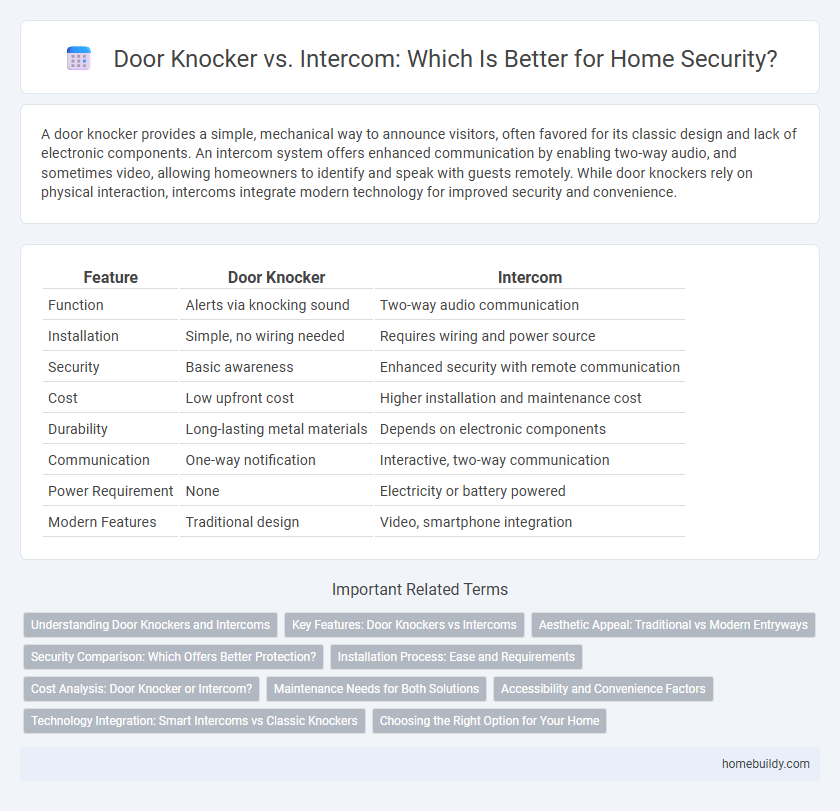A door knocker provides a simple, mechanical way to announce visitors, often favored for its classic design and lack of electronic components. An intercom system offers enhanced communication by enabling two-way audio, and sometimes video, allowing homeowners to identify and speak with guests remotely. While door knockers rely on physical interaction, intercoms integrate modern technology for improved security and convenience.
Table of Comparison
| Feature | Door Knocker | Intercom |
|---|---|---|
| Function | Alerts via knocking sound | Two-way audio communication |
| Installation | Simple, no wiring needed | Requires wiring and power source |
| Security | Basic awareness | Enhanced security with remote communication |
| Cost | Low upfront cost | Higher installation and maintenance cost |
| Durability | Long-lasting metal materials | Depends on electronic components |
| Communication | One-way notification | Interactive, two-way communication |
| Power Requirement | None | Electricity or battery powered |
| Modern Features | Traditional design | Video, smartphone integration |
Understanding Door Knockers and Intercoms
Door knockers provide a traditional, mechanical way to announce visitors by producing a distinct sound when struck against the door, requiring no electricity or wiring. Intercom systems offer enhanced communication through electronic voice transmission, allowing occupants to speak with visitors before granting access, significantly improving security and convenience. Understanding the fundamental differences highlights that door knockers emphasize simplicity and durability, while intercoms prioritize functionality and control in modern home entry systems.
Key Features: Door Knockers vs Intercoms
Door knockers provide a simple, mechanical method for visitors to announce their presence, featuring durable metal construction and classic designs that complement various architectural styles. Intercoms offer advanced communication capabilities, including audio or video interaction, remote door unlocking, and integration with smart home systems. While door knockers excel in low-maintenance reliability, intercoms prioritize enhanced security and convenience through technological functionality.
Aesthetic Appeal: Traditional vs Modern Entryways
Door knockers offer a timeless, vintage charm that enhances traditional entryways with rich textures and classic materials like brass or wrought iron. Intercom systems integrate sleek, minimalist designs that complement modern architecture, providing a high-tech, unobtrusive aesthetic. Choosing between a door knocker and an intercom depends on blending the entryway's visual style with functional preferences for security and communication.
Security Comparison: Which Offers Better Protection?
Door knockers provide a traditional, physical barrier but lack advanced security features, making them vulnerable to unauthorized access. Intercom systems offer enhanced protection through audio and video communication, enabling homeowners to verify visitors before granting entry. The integration of smart technology in intercoms significantly improves security by allowing remote monitoring and control.
Installation Process: Ease and Requirements
A traditional door knocker offers a simple installation process requiring basic tools and no electrical wiring, making it quick and cost-effective to mount on most doors. In contrast, an intercom system demands more complex installation involving electrical connections, potential wiring through walls, and access to a power source, which may require professional assistance. Homeowners seeking minimal setup effort typically prefer door knockers, while intercoms suit those prioritizing advanced communication features despite the installation challenges.
Cost Analysis: Door Knocker or Intercom?
Door knockers typically offer a low-cost, maintenance-free entry alert compared to intercom systems, which involve higher initial installation fees and ongoing maintenance expenses. Intercoms provide advanced features such as two-way communication and remote access, but their complexity and technology result in increased costs over time. Choosing between a traditional door knocker and an intercom depends largely on budget constraints and the desired level of functionality for property security and convenience.
Maintenance Needs for Both Solutions
Door knockers require minimal maintenance, mostly limited to cleaning and occasional tightening of screws to prevent wear and rust. Intercom systems demand regular upkeep including software updates, battery replacements, and troubleshooting potential wiring or connectivity issues to ensure consistent audio and video performance. Maintenance costs for intercoms are generally higher, reflecting their complexity compared to the simple mechanical design of door knockers.
Accessibility and Convenience Factors
Door knockers provide immediate tactile and auditory feedback, making them simple and accessible for individuals who prefer direct physical interaction. Intercom systems offer enhanced convenience by enabling remote communication and entry control, ideal for people with mobility challenges or those seeking hands-free access. The choice between a door knocker and an intercom often depends on the specific accessibility needs and lifestyle preferences of the user.
Technology Integration: Smart Intercoms vs Classic Knockers
Smart intercoms integrate advanced technology such as video cameras, remote access via smartphones, and two-way audio communication, enhancing security and convenience compared to classic door knockers. Classic door knockers rely on mechanical sound signals without connectivity features, lacking real-time interaction and remote monitoring capabilities. The integration of IoT devices in smart intercom systems provides homeowners with modern control and increased situational awareness at entry points.
Choosing the Right Option for Your Home
Door knockers offer a classic, no-power-needed solution to announcing visitors, adding aesthetic charm and durability to your doorstep. Intercom systems provide advanced security features, including two-way communication and remote access, enhancing visitor management and safety. Choosing between a door knocker and intercom depends on your home's need for technology integration, budget, and security preferences.
Door knocker vs Intercom Infographic

 homebuildy.com
homebuildy.com